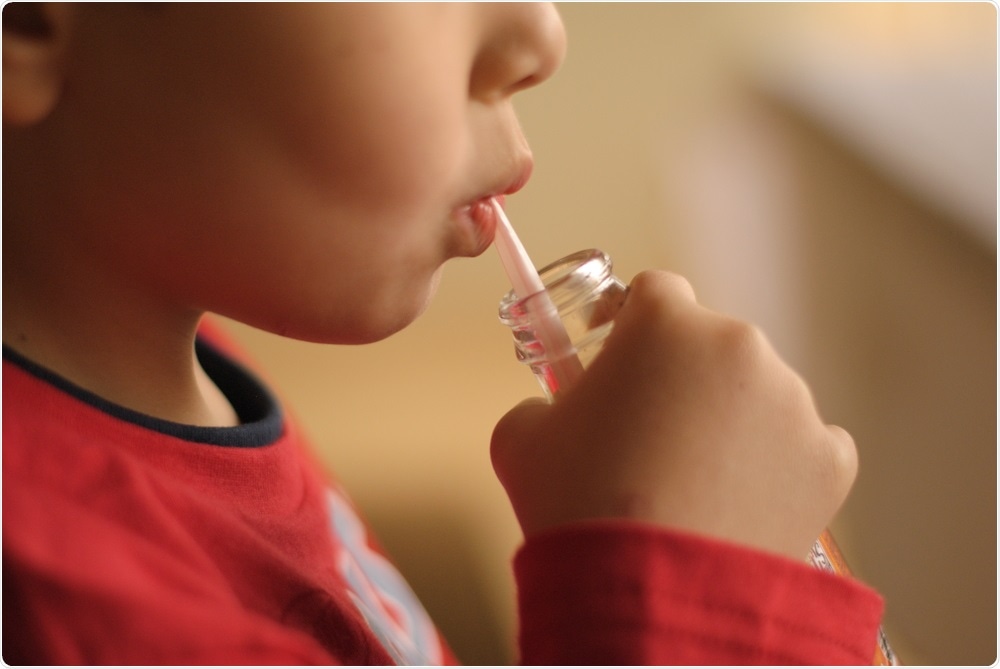A new study has concluded that children who consume sugar-sweetened beverages are no more likely to have a higher body mass index (BMI) than children who do not. This is in contrast to previous research suggesting that children who prefer soft drinks to water are at a higher risk of obesity. The researchers suggest that the UK 'Sugar Tax' on sugary drinks is unlikely to have an impact on childhood obesity rates.
 Carolina Steinke Xavier | Shutterstock
Carolina Steinke Xavier | Shutterstock
Information was analyzed from a nationally representative survey including 1,298 children from the UK aged 4-10 years old between 2008 and 2016. Each year, parents of the children sent a four-day food diary, which included the children’s dietary intake and how many sugary soft drinks they consumed, as well as their height and weight.
Overall, the researchers found that 61 percent of children included in the survey consumed at least one sugar-sweetened soft drink during the four-day survey period.
Most children consume more than the recommended added sugar levels
Intake of added sugars called non-milk extrinsic sugar (NMES) from food and beverages were found to be higher than the recommended levels in 78 percent of the children.
NMES is a type of sugar or carbohydrate, that is added to confectionary, honey and fruit juices, among others. It does not include sugars that are naturally found in fruit and 50 percent of dried and canned fruit products.
It is estimated that school-aged children and teenagers consume three times more than the recommended levels of NMES in the UK every day.
In this study, NMES from soft drinks, fruit drinks, and energy drinks were found to be the biggest source of sugar in the children’s diets, with 11 to 18 year olds consuming an average of 336mL a day.
A tax on sugar
It is because of this high intake of sugar from soft drinks that the Soft Drinks Industry Levy was brought into action in April of 2018 in the UK. Commonly known as the ‘Sugar Tax’, 50 percent of soft drinks manufacturers have reduced the sugar content of their drinks to avoid paying the levy that will fund sports and healthy pupils initiatives in education, which is expected to raise around £240 million per annum.
In England alone, one-third of children are obese or overweight when they leave primary school and 80 percent of these children will remain obese in adulthood.
Public Health Minister Steve Brine MP said that “Our teenagers consume nearly a bathtub of sugary drinks each year on average.”
Exchequer Secretary to the Treasury Robert Jenrick MP said: “The Soft Drinks Levy is one part of our plan to tackle childhood obesity.”
Sugar tax ‘might not be the most effective tactic’
However, lead author of the new University of Nottingham study Ole Anabtawi doesn’t believe that tactics like the Soft Drinks Levy might not be enough to fight childhood obesity.
High-intake of added sugars was not directly correlated with high energy consumption,” Anabtawi said. “Therefore, relying on a single-nutrient approach to tackling childhood obesity in the form of a soft drink tax might not be the most effective tactic.”
When comparing children who did drink sugary soft drinks with those who didn’t, it was found that consumption of added sugars from the diet was over the recommended amounts in 688 out of 1071 children.
Despite this, 78 percent of children were not consuming more than the recommended calories for their age. In addition, no differences were seen between genders, ages and most importantly, BMI, in children who consumed soft drinks compared to those who did not.
Anabtawi explained: “Our findings indicate that drinking sugar-sweetened beverages is not a behaviour particular to children with a higher body weight.
“On the contrary, framing sugar reduction in tackling obesity might reinforce negative stereotypes around ‘unhealthy dieting’.
“Instead, policies should focus on those children whose consumption of sugar-sweetened drinks substantially increases their total added sugar intake in combination with other public health interventions.”
Delving deeper into the relationship between behaviors, weight, and other outcomes would increase the effectiveness of public health interventions and reduce the occurrence of unintended consequences such as food guilt and restricted eating.”
There were limitations to Anabtawi’s study, including that the study did not consider physical activity levels that may have altered its results.
Sugar intake is a ‘complex’ issue
Dr. Katarina Kos from the University of Exeter believes that the effects of excess sugar consumption in childhood may not present themselves until adulthood, and as such warns against using the results of this new study to condone high intake of sugary soft drinks.
“The study should not be seen as a reassurance that we can relax about sugar-sweetened drinks, but as the authors also say, it highlights the complexity of [the] environment. Children who exercise less than they used to need fewer calories and less energy, whatever the source,” Dr. Kos explained.